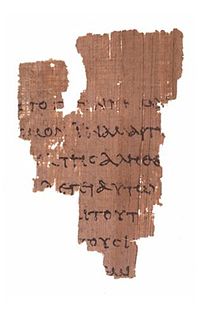
 |
Freethought & Rationalism ArchiveThe archives are read only. |
|
|
#41 | |||
|
Veteran Member
Join Date: May 2008
Location: AUSTRALIA
Posts: 2,265
|
Quote:
The proof John could not have written before the temple's destruction is also blatant: where is the writings predating the Temple's destruction? no excuses- writings was commonplace at this time. Think dead sea scrolls and 1000's of Roman archives. <edit> Does 'belief' transcend truth? |
|||
|
|
|
|
#42 | |
|
Veteran Member
Join Date: Jan 2007
Location: USA
Posts: 2,608
|
Quote:
 Which is what seems to have happened with the Jews and Rome. Which is what seems to have happened with the Jews and Rome. Rendering to Caesar what is Caesars is not a Christian doctrine. |
|
|
|
|
|
#43 |
|
Veteran Member
Join Date: Jan 2008
Location: Latin America
Posts: 4,066
|
<removed>
|
|
|
|
|
#44 |
|
Veteran Member
Join Date: Jan 2008
Location: Latin America
Posts: 4,066
|
|
|
|
|
|
#45 | |||
|
Veteran Member
Join Date: Jul 2004
Location: Dancing
Posts: 9,940
|
Quote:
It might be more accurate to say that this gospel was written 70 - 80 years after the supposed events it depicts. Which isn't a lot better than 100 years. |
|||
|
|
|
|
#46 | ||
|
Veteran Member
Join Date: Jan 2007
Location: USA
Posts: 2,608
|
Quote:
|
||
|
|
|
|
#47 | ||
|
Veteran Member
Join Date: Jan 2008
Location: Latin America
Posts: 4,066
|
Quote:
 Quote:
|
||
|
|
|
|
#48 |
|
Veteran Member
Join Date: Jan 2007
Location: USA
Posts: 2,608
|
Neither did the Jews. They did just as everyone else. They accepted what they were given without question.
|
|
|
|
|
#49 | |
|
Veteran Member
Join Date: Jan 2008
Location: Latin America
Posts: 4,066
|
Quote:
|
|
|
|
|
|
#50 | |||
|
Veteran Member
Join Date: May 2008
Location: AUSTRALIA
Posts: 2,265
|
Quote:
Just when you got me interested it becomes an anti-climax. I honestly cannot accept this, specially because of the lack of surrounding evidences and that of any Hebrew writings - which I find more reliable than the European. This fragment is in major dispute of its dating: Quote:
Quote:
|
|||
|
|
| Thread Tools | Search this Thread |
|